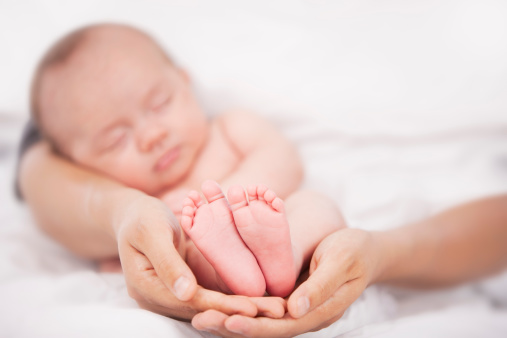The story in my head said girls grow up to be their mothers’ friends, and boys just grow away.
Soon after my first baby was born, while my husband and I delighted in his perfect tiny self and basked in the glow of me no longer being pregnant or in labor, Eric met my eyes and asked if I was sad. Because he knew I’d really, really wanted a girl.
It’s true: I had hoped for a daughter. The story in my head said girls grow up to be their mothers’ friends, and boys just grow away. It seemed like all the young women I knew were close with their parents, while the young men had withdrawn sometime before junior high. The story in my head said our culture may tell my daughter to hate her body, but it will tell my son to be arrogant and unkind. I could picture shielding a girl from sexism, but the flip side seemed both foreign and undefeatable to me. Boys will be boys.
I had specifically hoped that our first baby would be a girl. (Always the sensible one, my husband never cared one way or the other.) We knew we might only want two, and I didn’t want to spend the second pregnancy anxious about this part of the outcome. On the off-chance that my emphatic hoping didn’t do the trick and our first child turned out to be a boy, I figured I might find out the fetal sex via ultrasound during a second pregnancy so I’d have time to get happy about it either way. I didn’t want to damage the postpartum days with my weird baggage, which I knew even at the time was weird.
In short, I cared.
Now I do not care.
Not just now—eight years after that first baby was born (and two years after our second baby also came out male). From the moment I kissed Noah on his forehead, I did not care. Boys, girls, how could I possibly be bothered with such absurd details? My baby. My babies. My experience of them, I’ve found, has almost nothing to do with gender.
So as it turns out, I had Noah and then Simon. Despite my earlier plans to prepare myself, I didn’t find out the fetal sex in advance the second time around. I just absolutely did not care, and I couldn’t quite remember why I ever had.
We didn’t have a daughter.
What we had, instead, are two children.
One who loves flowers and bright colors and scientific facts and fantasy novels, who mixes bold patterns in his outfits, who is shockingly verbal and has an amazing memory, who has been incredibly gentle to plants and animals from birth. One who has mind-boggling balance and other physical skills, who’s totally in his body, who is rough-and-tumble and will gleefully rip a plant to shreds if he can reach it, who runs to get an ice pack when his sibling cries, who bubbles over with good cheer. One who weeps at the drop of a hat; one who hardly seems to notice pain. One who waits to try a new skill until he’s all the way ready to excel and then just takes off; one who throws himself into it prematurely and makes a mess and then just takes off.
Two children who are both sweet and troublesome and funny and exhausting.
It turns out the fact that they’re boys just doesn’t matter much to how our family feels. It turns out that they’re individuals.
During the almost six years between Noah’s birth and Simon’s, I experienced the concrete reality of how our particular family operates, how our parenting roles aren’t determined by our genitals. Between Noah’s birth and Simon’s, I also became immersed in feminism. I devoured tons of feminist writing about pregnancy, childbirth, and parenting. That was my gut reaction to the shockingly gendered nature of parenting and children’s cultures: I didn’t feel like a mom, my partner didn’t act like a dad, and we were both so offended by the pink dress-up and blue weaponry aisles that I consoled myself with feminist analysis.
I realized that we as a society are way too attached to the “boy” and “girl” labels. That “daughter” and “son” aren’t magic words for lifelong relationship patterns. That we are actually talking about people here.
So by the time Simon was born—by that moment when I knew I’d never give birth to a daughter—it didn’t matter to me after all. I knew I’d have my baby. My babies.
Whoever they turn out to be.
Molly Westerman is a writer, book nerd, PhD, and parent. Her current projects include a book for feminist parents and the blog First the Egg. You can find her on Twitter here.
Related Links:

